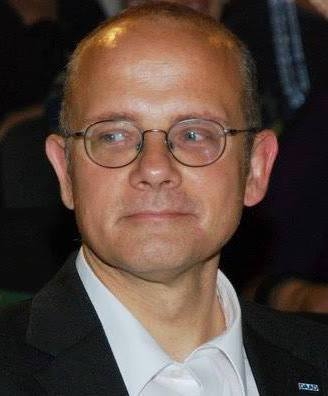However, in 2007, Demidov, with explicit reference to Dugin, also acknowledged to be a “convinced Eurasian.” This is oddly the same phrase that Dugin had used 15 years earlier to describe the political beliefs of Reinhard Heydrich (1904-1942), the infamous chief of the SS Security Service and one of the planners of the Holocaust. Dugin sees his Eurasian movement as the follower of a secret “Eurasian Order” that existed for centuries, and included, among others, various German ultra-nationalists.
While at times strongly distancing himself from Hitler’s crimes, Dugin has, throughout the 1990s, repeatedly expressed his admiration for certain aspects of the Nazi movement. For instance, he called the theory sector of the Waffen-SS an “intellectual oasis” within the Third Reich, and admitted that National Socialism was “the fullest and most total realization” of the Third Way that Dugin advocates until today. In one of his numerous pro-fascist articles of the 1990s, Dugin gets excited about the prospect that, after the failures of Germany and Italy, there will, in Russia today, finally emerge a truly “fascist fascism.”
In the new century, to be sure, Dugin’s rhetoric has become more cautious. Now a frequent political commentator on various TV shows, he often poses as an “anti-fascist” and describes himself as a “radical centrist.” Dugin tries to draw a line between the inter-war right-wing intellectuals whom he admires and those who supported Hitler. Yet, as late as 2006, Dugin admitted that among his models are the ultra-nationalist German brothers Otto and Gregor Strasser who got into personal conflicts with Hitler in the early 1930s, yet had also played a crucial role in making the National Socialist German Workers Party (NSDAP) a mass party in the 1920s. In March 2008, his WWW site Evrazia.org confirmed that Dugin has still sympathies for the Strasser brothers.
In spite of many similar well-known statements by Dugin and his associates, Demidov enthusiastically expressed his admiration for Russia’s chief “neo-Eurasianist” in an interview for Dugin’s website Evrazia.org in 2007. Demidov stated, among others, that “doubtlessly, a crucial factor, a certain breaking point, in my life, was the appearance of Alexander Dugin.” Moreover, Demidov proclaimed that “it is high time to start realizing the ideas, as formulated by Alexander Dugin, of the radical center, through projects.”
In his new position as chief ideologist of Russia’s ruling United Russia party, Demidov will have ample opportunity and the necessary resources to do so.
(Note: You can view every article as one long page if you sign up as an Advocate Member, or higher).





